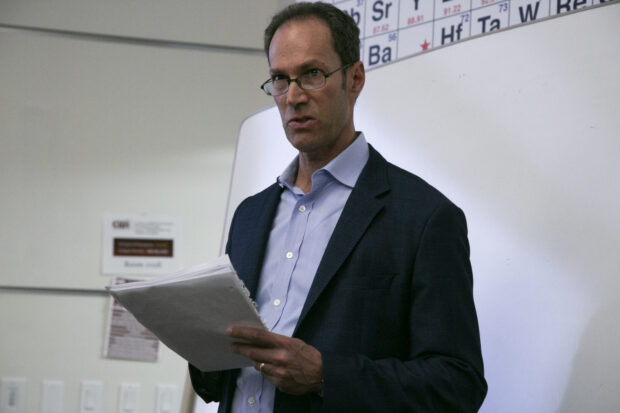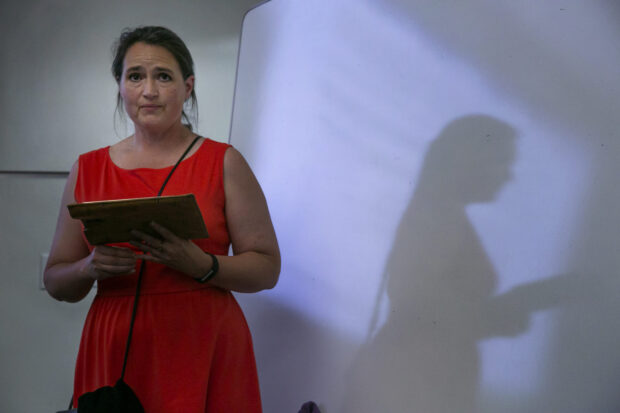Well over 100 people packed a College of Western Idaho meeting room to standing-room only on Monday night, for a State Board of Education hearing that turned into a showdown over Idaho Core Standards.
About 30 people testified, and the majority spoke in favor of keeping Idaho’s version of Common Core. Among them were teachers who wrapped up their first day of classes on Monday, then spent their evening at the almost three-hour long State Board hearing.
“We’re exhausted and we care about these students,” said Nampa teacher Jenna Raino, who testified in support of the standards. “We cared enough to show up today because this is really important.”
Monday’s hearing was the first of four scheduled by the State Board to discuss Idaho’s “rules governing thoroughness.”
The hearings were scheduled in response to public requests. Hundreds of people asked the State Board for hearings on administrative rules, driven in large part by a petition circulated by the Idaho Freedom Foundation, which is calling for a Common Core repeal. Because of the multitude of requests, the State Board was required by law to hold hearings.
Idaho adopted a version of Common Core in 2011, called the Idaho Core Standards. While those have been changed some, they are still in effect.
A rules debacle in the Statehouse this year revived debate over those standards.
Legislators left the 2019 session in a deadlock over administrative rules, which govern areas such as academic standards.
Gov. Brad Little temporarily reinstated most rules until the 2020 session, including the Idaho Core Standards.
Still, legislators will have to review the entire set of Idaho’s administrative rules when they meet for the 2020 session, meaning they could rehash a once-settled argument over whether Idaho Core Standards are the right approach for public schools.
Monday’s hearing provided a glimpse of that debate.

Fred Birnbaum, vice president of the Idaho Freedom Foundation, was the first to speak against the standards.
He argued that the standards do not improve student results and were rushed into implementation. He suggested Idaho follow the lead of Florida, which repealed Common Core standards that Birnbaum said “did not reflect state priorities.”
“Why not craft clear standards that serve the needs of Idaho?” he said. “Nobody is suggesting no standards, just selecting the best standards.”
Other opponents argued that Common Core stifles Idaho’s ability to deviate from national standards and said the standards don’t properly prepare students.
Current teachers and business leaders argued against those points.
Proponents said Idaho teachers helped create the state standards and retain flexibility in deciding how to teach them. They also said the standards prepare students for the 21st Century curriculum by prioritizing problem-solving. For some teachers, switching to Idaho Core Standards has been difficult, educators said, but mastering the standards and understanding their effectiveness takes time and effort.
Lindsay Mangum, a fourth-grade teacher in the Vallivue School District, said the standards have changed her teaching for the better. Instead of focusing on memorization, Mangum said, her students now have to work on critical thinking and using evidence to have respectful conversations: “all things that are required to be successful outside of a classroom setting.”
“Because of the standards, my students can communicate with each other more respectfully than most adults can on Facebook,” she said, to laughter from the crowd. “Previous standards were not this rigorous.”

More hearings are scheduled through Aug. 27, after which the State Board will decide whether to endorse or change the current rule. The standards then go back in front of legislators during the 2020 session as a “pending rule.”
The State Board language would pass if either the House or Senate education committee signs on. But the committees could also agree to delete sections of the rule, or agree to reject it entirely.
Multiple legislators were in the audience listening to testimony Monday, including members of both the House and Senate education committees. About half of the audience wore red, or T-shirts reading #RedforEd, a slogan of the National Education Association.
West Ada Education Association president Eric Thies told the audience that teachers call to #RedforEd when they feel education is under attack.
“When you threaten to repeal our standards that we’ve worked really hard at learning and establishing, it really does feel like an attack,” Thies said. “You’re pulling the rug out from underneath us.”
Kevin Richert contributed to this report.
